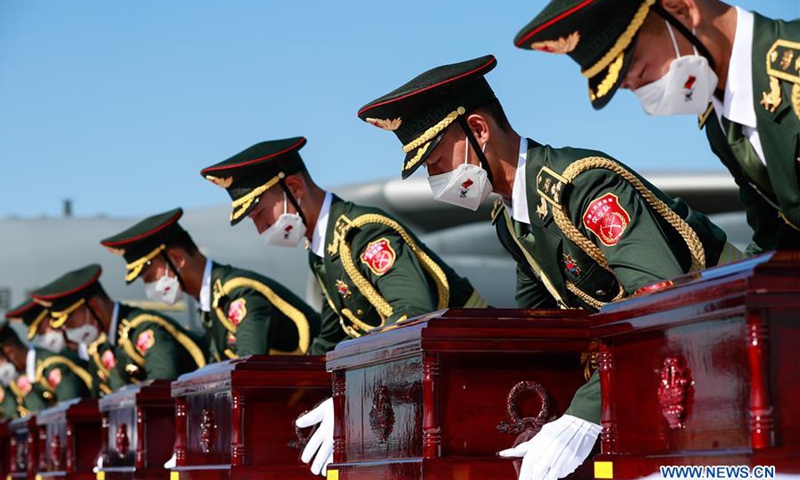History teaches US futility of China war
By Ling Shengli Source: Global Times Published: 2020/10/18 20:23:40

Chinese soldiers prepare to carry to a plane coffins containing remains of Chinese soldiers killed in the 1950-53 Korean War during a repatriation ceremony at Incheon International Airport in Incheon, the Republic of Korea (ROK), Sept. 27, 2020. The remains of 117 Chinese soldiers killed in the 1950-53 Korean War were returned to China on Sunday from the ROK. It is the seventh such repatriation following a handover agreement signed by the two countries. Photo: Xinhua
Since US President Donald Trump took office, the strategic competition between China and the US has seriously intensified. The debate over whether or not the two will slide into "Thucydides Trap" is gaining momentum. How to avoid a new cold war and the Thucydides Trap so as to prevent a military showdown is a question worthy of consideration. To avoid military clashes, it is vital that they do not make strategic missteps.Seventy years ago, China and the US were engaged in the Korean War (1950-53). It was not the will of either side, but the tragedy still took place. The US strategic miscalculation was to blame. The US failed to figure out the message from the Chinese side that the latter would not sit still if the US army crossed the 38th Parallel. It also underestimated China's determination to safeguard its national security.
As a result, both China and the US suffered heavily in this war. Chairman of the Joint Chiefs of Staff Omar Bradley said that the US strategy of extending the Korean War to China "would involve us in the wrong war, at the wrong place, at the wrong time, and with the wrong enemy."
Although almost 70 years have passed, this conflict remains a touchstone of historical memory that is frequently referenced for the two to avoid future military clashes.
The war was an asymmetrical one. There was a huge technology gap between the Chinese military and the US forces. Still, the conflict made the US realize that going to war with such a big country as China would cost it dearly. That is why the US tried hard to avoid any military clashes with China during the Vietnam War.
Furthermore, China's strength is now greatly enhanced seven decades later. The structural contradictions between China and the US have become prominent than ever. And the posture of the strategic competition between the two will hardly change in a short time, though there are risks of military clashes in various fields, such as Taiwan, the Diaoyu Islands and the South China Sea. This makes communications and negotiations particularly important between the two sides.
Three reasons may lie behind a potential military conflict between the two. Firstly, armed confrontations between the two could intensify. In order to maintain and consolidate US military supremacy in the Asia-Pacific, the US will keep imposing pressure on China. It will continue to suppress China as it views China's growing military strength as a threat. To safeguard its increasing overseas interests, China's military strength must expand accordingly. This may increase odds for a military confrontation between the two.
Secondly, could a true military crisis occur? The highly tense military pressure the US imposes on China may spark a fight. Since Trump took office, the US has really ramped up its military actions in the South China Sea, particularly with close reconnaissance. The escalation of the US' dangerous moves in the waters adds to risk for a skirmish to break out.
Thirdly, the US resorts to the military means for the sake of its allies and other factors. From a historical point of view, major powers have often gone to a war because of external factors. The Peloponnesian War (431-405 BC) between Athens and Sparta was an early example.
As stated above, it is quite urgent for the two sides to work out how to prevent military clashes from happening. In recent years, China and the US have talked multiple times about strengthening control and management of strategic divergences and crises. This means preventing any military conflict whatsoever. Even if the two do not want to go to war, this does not necessarily mean there is no risk of an actual fight accidentally transpiring.
China advocates peaceful development and adheres to defensive national defense policies. It has exercised restraint in territorial disputes with other countries. This perhaps more than anything else has greatly reduced the possibility of a military showdown with the US.
Therefore, whether a war takes place mainly depends on US judgment. It is well known that the US constantly makes strategic miscalculations; as in the cases of the Korean War and the Iraq War. To deal with a heavy-weight competitor like China, the US should pay particular attention and avoid strategic errors at all costs.
Under the current situation, the US would not gain any extra advantage should it go to war with China. This fatal move would deal a decisive blow to US hegemony. Sensible US strategists have realized that peaceful existence and competition with China more fits US interests. History has taught the US a lesson - Strategic miscalculations with China will see the US pay a heavy price - one it clearly cannot afford.
The author is secretary-general of the International Security Study Center at China Foreign Affairs University. opinion@globaltimes.com.cn
Posted in: VIEWPOINT